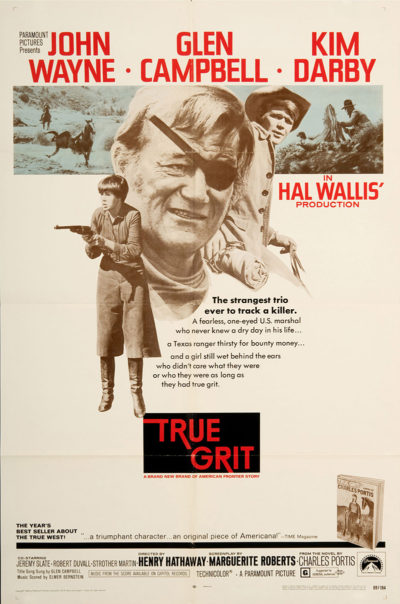 By Michael Swanger
By Michael Swanger
Of the more than 160 movies in which John Wayne starred as the leading man, arguably no other film and its title — except, perhaps, his finale, “The Shootist” — symbolizes the depth and complexity of Wayne’s 50-year career better than “True Grit.”
This year marks the 50th anniversary of “True Grit,” a monumental and time-honored Western that superseded the genre’s boundaries when it was released to critical acclaim in 1969. For his fearless and bold portrayal of the movie’s larger-than-life sheriff Rooster Cogburn, Wayne won his only Oscar for Best Actor. It was a fitting role and humbling Academy Award victory that Wayne’s daughter, Aissa Wayne, summed up in her 1991 autobiography, “John Wayne – My Father.”

“… There was no industry doubt about which veteran actor would play the paunchy, grizzled, aging, hard-drinking Cogburn, a man at once heroic and flawed,” she wrote. “True Grit’s director and my father’s old friend, Henry Hathaway called my father the same day the deal was completed. ‘This Cogburn fellow is a man who wenches when we wants, gets drunk when he wants, and fights when he’s in the mood. He’s as much sinner as saint — and you, Duke, old friend, are going to play him that way.’ Hathaway also told him to play Cogburn broadly, as a mean old man indifferent to his appearance, and so not to bother dieting. This was like telling my dad he did not have to pay that year’s federal taxes.
“… By playing Rooster Cogburn, an aging drunken lout whom Robert Duvall called ‘a one-eyed fat’ man, and who’d bellowed back at Duvall, ‘Fill your hands, you son of a bitch!” my father poked humorous holes in both his professional and personal image. But even when the Eastern critics joined the applause, he felt fairly certain he’d wind up disappointed. He’d been nominated just once in his long career, for his stirring portrayal of Sergeant Stryker in Sands of Iwo Jima. On that night in 1949, my father lost to Broderick Crawford for All the King’s Men. Twenty years and no nominations later, he predicted he’d once again play bridesmaid.”
When Barbara Streisand announced Wayne as the Best Actor winner on Oscar night, April 13, 1970, the legendary movie star renowned for his portrayal of rugged cowboys, revealed his true grit as he humbly accepted the award with a brief, but heartfelt acceptance speech. As he appeared to wipe away a tear with his head bowed, Wayne quipped, “Wow, if I’d known that, I’d have put that patch on 35 years earlier … I feel very grateful, very humble and owe thanks to many, many people.”
Two years prior to winning the Oscar, critics and Vietnam War protesters skewered Wayne for 1968’s “The Green Berets.” But on that night, wrote Aissa Wayne, her father was “floating on Oscar’s rarified air.”
“For all of us who loved my dad, it was a night of sublime satisfaction. There had never been any doubt of my father’s bankability, but this validated his acting, and we all knew how much that secretly meant to him,” she wrote.
During its annual John Wayne Birthday Celebration on May 24-25, the John Wayne Birthplace & Museum in Winterset will honor the town’s famous native son who was born there on May 26, 1907, as Marion Robert Morrison, and celebrate the milestone anniversary of “True Grit.” The event will include screenings of the movie at the Iowa Theater; appearances by stuntman Dean Smith, who worked on “True Grit,” among other Wayne films; and a performance at the Benefit Dinner & Auction by country music singer Ashley Campbell, daughter of “True Grit” co-star and country music star Glen Campbell. The museum will also feature an exhibit of “True Grit” memorabilia, including Wayne’s clothing and an eyepatch that he wore in the film, as well as an original 1970 Academy Awards program autographed by Wayne and others.
To celebrate “True Grit” is to honor an iconic film, Wayne’s devotion to his craft and his enduring legacy.
TO READ MORE FASCINATING STORIES ABOUT IOWA HISTORY, subscribe to Iowa History Journal. You can also purchase back issues at the store.
